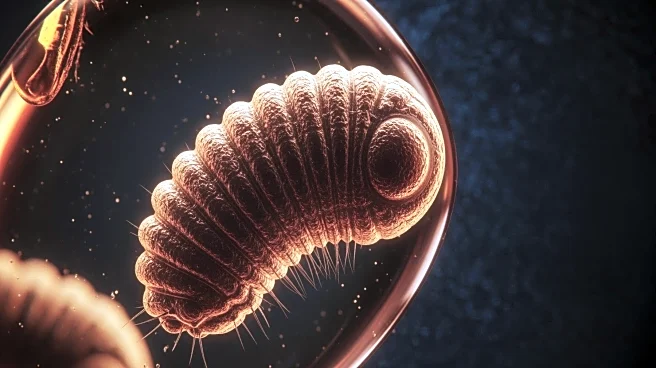What's Happening?
NPR's Short Wave podcast delves into the ancient history of parasites, revealing that these organisms have existed for over 500 million years, predating even the dinosaurs. The episode features discussions with paleontologists Karma Nanglu and Danielle
de Carle about a mysterious fossil known as the 'Riddler' and the oldest leech fossil ever discovered. These fossils are rare due to the soft tissue composition of parasites, which does not preserve well in rock. The podcast highlights the enduring nature of parasitism and its historical significance, suggesting that clues to prehistoric mysteries may be hidden in unexpected places.
Why It's Important?
Understanding the history of parasites provides valuable insights into their evolution and the role they have played in ecosystems over millions of years. This knowledge can inform current scientific research and public health strategies, as parasites continue to impact human and animal health today. By studying ancient parasites, scientists can better understand how these organisms adapt and survive, potentially leading to improved methods for controlling parasitic diseases. The research also underscores the importance of paleontology in uncovering the hidden stories of Earth's biological past, which can have implications for biodiversity and conservation efforts.
What's Next?
The exploration of ancient parasite fossils may lead to further discoveries that could reshape our understanding of parasitism and its impact on evolution. Continued research in this field could uncover more about the relationships between parasites and their hosts, offering new perspectives on ecological interactions. As scientists continue to study these fossils, they may also develop new techniques for identifying and preserving soft tissue remains, enhancing our ability to study ancient life forms. This ongoing research could influence future studies in evolutionary biology and contribute to the development of new medical and environmental strategies.
Beyond the Headlines
The study of ancient parasites not only sheds light on the past but also raises ethical and philosophical questions about the nature of life and survival. Parasitism, often viewed negatively, is a natural and integral part of ecosystems, challenging our perceptions of 'good' and 'bad' organisms. This research invites a broader discussion on the interconnectedness of life and the complex dynamics that have shaped the natural world. It also highlights the importance of preserving and studying fossils, which serve as vital records of Earth's history and evolution.















